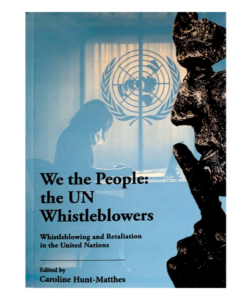We the People: Whistleblowers, Whistleblowing & Retaliation in the United Nations
REVIEWS, 9 Dec 2024
Jorgen Johansen | Irene Publishing - TRANSCEND Media Service
1 Dec 2024 – The United Nations internal justice system ignores or harms the vast majority of its whistleblowers, sobering new book documents.
- Whistleblowers uncover more corruption and fraud than all other measures combined, including auditors
- But over a decade, only 2.6% of the UN workers who asked for whistleblower protection were granted it
- Many UN whistleblowers end up losing their jobs, are portrayed as mentally unstable by management, or face crushing legal bills
- Six whistleblowers tell their stories: One senior UN official recounts how he was asked to resign after he intervened to stop the rape of boys in a refugee camp in the Central African Republic
For decades, the United Nations and its specialized agencies have been touting their dedication to protecting workers whose duty it is to report internal misconduct and corruption. The term “whistleblower protection” echoes through the UN’s bulky, ever-shifting policies.
But the forthcoming book, “We the People: The United Nations Whistleblowers, Whistleblowing & Retaliation in the United Nations,” (Irene Publishing, 1-1-2025), presents real cases, policy analysis and hard statistics to document how the ostensibly self-policing UN and its agencies continue to fail the vast majority of those who take the risk of coming forward to sound the alarm about missing money, sexual abuse and other offenses.
The book, co-authored by former UN staff members, UN whistleblowers, academics and lawyers familiar with the internal UN justice system, and edited by Caroline Hunt-Matthes, presents the powerful, detailed testimony of six UN whistleblowers. These whistleblowers recount the abuses they reported, and the personal, financial and professional anguish that speaking out brought them.
Their experiences show how the UN and its agencies react to whistleblower complaints: by closing ranks, labelling claims as “unsubstantiated” and simply doing nothing. Whistleblowers find themselves denounced by their UN employers, ostracized at work, stripped of their jobs, falsely portrayed as mentally unstable and subjected to legal action.
“The bottom line and bizarre paradox is that currently the UN is not a safe environment for UN staff members to blow the whistle, which is a mandatory requirement for a UN staff member encountering misconduct,” Ms. Hunt-Matthes said.
The book provides constructive suggestions to improve the UN’s internal justice processes, long afflicted by entrenched bureaucracy, policy gaps and its reputational imperative.
According to statistics presented in the book, only 2.6% of the UN staff members who asked for whistleblower protection received it during the years 2006-2016 and only 4.8% in 2017-2022, despite revised rules.
The book asserts that these low protection rates create a chilling affect for those thinking about reporting abuses. Among the book’s most shocking statistics:
- Whistleblowers who actually received protection since the 1996 inception of the UN Ethics offices include 0% at the UN Refugee Agency (UNHCR), 1.4% at UNICEF 5.5% at the World Food Programme (WFP), and 5% at the UN Development Programme (UNDP).
The book’s contributors include Anders Kompass, the former director of field operations and technical cooperation at the Office of the United Nations High Commissioner for Human Rights, describes how he was was suspended from his job and faced dismissal after he informed French authorities about sexual abuse of refugee boys in the Central African Republic by French peacekeepers. Kompass was eventually exonerated of wrongdoing.
Ms. Hunt-Matthes is an independent investigator specializing in sexual and gender-based violence and an adjunct professor at Grenoble Business School (GEM) and Geneva’s Webster University. For a decade she worked in the UN as an investigator in the Inspector General’s office. She was ousted from the organization after she began to gather evidence that a UN staff member had raped a refugee in Sri Lanka, opposing superiors who did not want the matter investigated.
“Most people, including most of those working for the UN, believe the system works,” writes Brian Martin, a veteran campaigner with Whistleblowers Australia, in the book’s introduction. “They believe that if there’s a problem, there must be some authority or process to address it, and surely the UN, with its unparalleled responsibilities and as a paragon of procedural justice, must be ideally placed to address problems. That is why this book is so important. The UN is just like any other large organization, and has the same sorts of problems. It is a seething mass of ambition, power plays and grievances, along with amazing dedication to human welfare. Often, the dedicated ones pay the penalty.”
For review copies for journalists or for interviews, contact Caroline Hunt-Matthes: huntmatthes@gmail.com
Purchase information for the public: https://www.lulu.com/spotlight/irene
https://irenepublishing.com/shop/
Tags: Corruption, Justice, United Nations, Whistleblowing
This article originally appeared on Transcend Media Service (TMS) on 9 Dec 2024.
Anticopyright: Editorials and articles originated on TMS may be freely reprinted, disseminated, translated and used as background material, provided an acknowledgement and link to the source, TMS: We the People: Whistleblowers, Whistleblowing & Retaliation in the United Nations, is included. Thank you.
If you enjoyed this article, please donate to TMS to join the growing list of TMS Supporters.

This work is licensed under a CC BY-NC 4.0 License.

What’s documented in Whistleblowers, Whistleblowing & Retaliation in the United Nations strongly echoes the experiences many of us have endured at UNOPS. The patterns of retaliation, silencing, and denial are all too familiar. For more stories and our ongoing efforts to expose these systemic issues, visit: https://tipoffice.substack.com